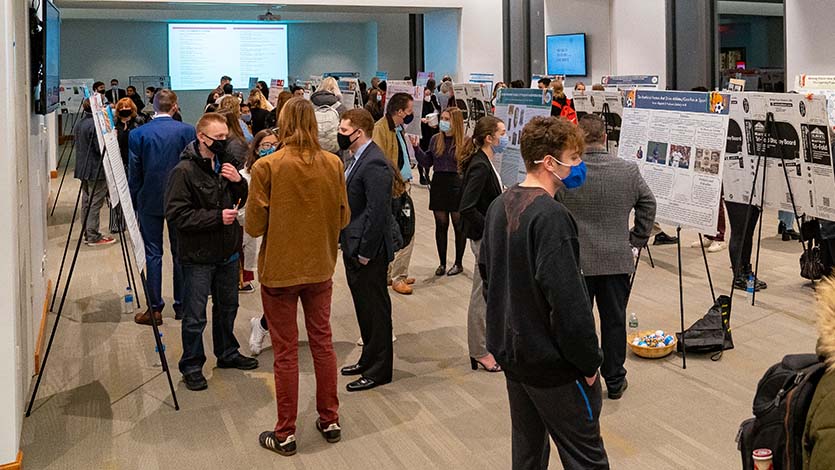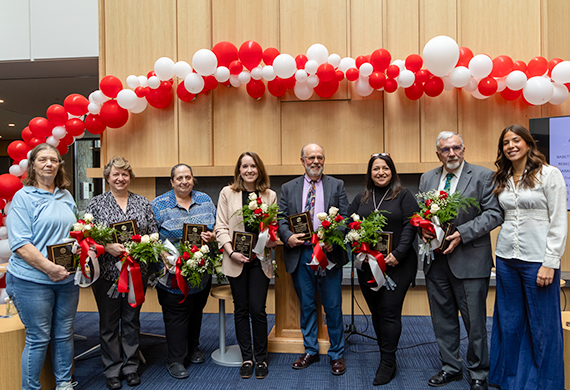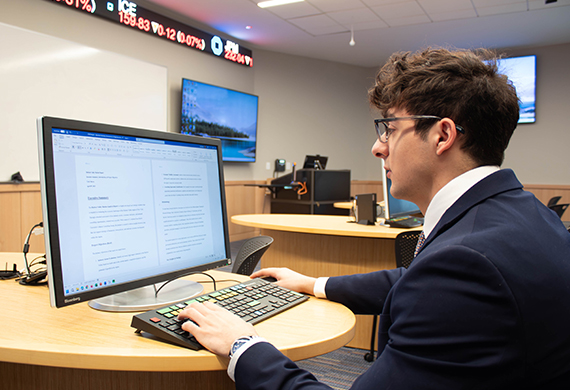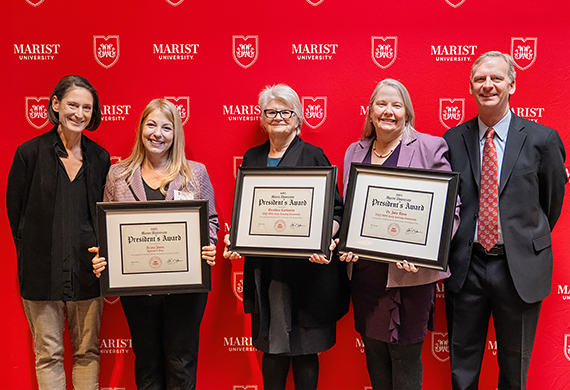Honors Thesis Exhibit Highlights In-Depth Student Research, a Cornerstone of Marist’s Education

January 12, 2022 — On Wednesday, December 8, senior honors students from across the College community gathered to present their semester-long research projects in the Fall 2021 Honors Thesis Exhibit. This semester, 38 students presented independent, faculty-mentored research covering topics such as the addictive nature of computers and phones, the life of first and second-generation Americans and their perception of American culture, and how consumers develop and maintain bad habits.
Dr. Carolyn Matheus, Honors Program Director and Associate Professor of Information Systems, summarizes the Honors Thesis Exhibit as a culmination of a student's experience and an opportunity to explore something that interests the students independently. “This experience challenges students to deeply explore a topic of interest - sometimes related to their chosen field of study and sometimes taking a wider interdisciplinary lens- while gaining applied insight into the research process with the individual guidance of faculty mentors,” said Matheus.
While their research combines all aspects of their education at Marist, it doesn’t stop with the final paper. Students demonstrate their expertise through skills gained throughout their four years at Marist during the Honors Thesis Exhibit.
“This academic forum provides a medium for students to demonstrate and discuss their research, drawing on skills they have developed during their time at Marist include writing, critical thinking, information literacy, communication through visual representations of their research, and oral presentation skills,” said Matheus.
Dr. James Snyder, Interim Dean in the School of Management and Interim Dean for Academic Engagement reinforces the notion that the Honors Thesis Exhibit is a way for the Marist community to see and ask questions about thoughtful, in-depth research their peers have conducted.
“Highlighting the projects signals to the college community the importance of undergraduate research and high-impact practices. The college community should be very proud of these students; the projects are not completed in a vacuum or in isolation, but with four years of support and encouragement from faculty, advisers, and staff,” said Snyder.
Navigating Two Worlds: The Experience of First and Second Generation Immigrant Students
Angelina Zacharias ‘22
Fascinated by how individuals interact with their environment and how personal experiences can change one’s thought process, Angelina Zacharias ’22, a Biomedical Science major and Music minor, focused on first and second-generation Americans. “For my project, focused on first and second-generation Americans and their perceptions of American culture and the acculturation process,” said Zacharias.
The origin of this project began long before she was born; being a second-generation American, she was surrounded by the Indian culture of her parents, all while trying to find her voice. “I wanted to see if other second-generation Americans had some similar experiences and how their experiences compared to those who were born in a different country and immigrated here,” said Zacharias.
Being in the Honors program and presenting in front of faculty, staff, and peers gave Zacharias an experience unlike any other during her four years at Marist. “It was different than any other presentation I have ever done because it was truly a topic that I was interested in, and I enjoyed sharing my research with my peers and professors!” said Zacharias.
Along with all honors thesis projects, Zacharias was mentored by a faculty member; in her case, it was Dr. Thomas Killian, Assistant Professor of Psychology.
Addiction and Technology – An Analysis of the Addictive Nature of Computers
Brian Sprague ‘22
Stemming from his honors-by-contract paper, Cybersecurity major and Computer Science and Psychology minor student Brian Sprague ‘22 began to analyze the addiction properties of computers and smartphones.
Using the combination of his Cybersecurity major and Psychology minor Sprague wanted to “compare the psychological factors of computer and smartphone addiction to the more common substance abuse and gambling addictions,” said Sprague.
Sprague collaborated with Professor Andrew Tokash Professional Lecturer of Computer Science, who served as his honors-by-contract faculty member and was the faculty advisor for his honors thesis. His efforts to conduct an in-depth analysis of the relationship between computers and smartphones to addiction was a culmination of his education so far as an Honors student.
“For me, the thesis project felt like an appropriate cap on my journey as an honors student because everyone presenting at the exhibit was able to put their touch on the honors program and was able to claim something that was theirs,” said Sprague.
Sprague was also able to form lifelong friendships through the honors program. Being placed into honors housing freshman year, Sprague has lived with his randomly selected roommate all four years. “Being an honors student has completely changed my path at Marist for the better. I still live with my freshman year roommate that I was randomly assigned on the honors floor of Champagnat, and am still friends with several people who lived on that floor,” said Sprague.
Initially nervous about his research and defending it in front of faculty and peers proved to be no problem for Sprague, who was backed by months of research and analysis to present a well thought, well-executed project. “I was expecting to be a little nervous, but that quickly went away after my first visitor. Answering questions turned out to be an easy task, as due to all of the research that I had been doing throughout the whole semester, I really became an expert on my topic,” said Sprague.
Conscious Consumerism: Bridging the Gap between Awareness and Action
Kaitlyn Hering ‘22
Wanting to research a topic that was not only interesting to her, Kaitlyn Hering ’22, a double major in psychology and business with a concentration in human resources and a social work minor, set out to discover how consumers elongated bad habits throughout their life. The research topic stemmed from one question.
“While people are held back for a variety of reasons ranging from access, to power, to monetary ability, the avenues for fixing these issues are quite simple and can be done either on an individual level or a community level,” said Hering.
The Honors program allowed Hering to further her education and develop lasting relationships with peers and faculty, furthering her academic career into a focused path. “This program gave me the opportunity to explore different classes, form strong peer and faculty relationships, and develop greater independence to lead my own research on a topic I was passionate about,” said Hering.
The process of conducting research and knowing dozens of other students around the campus are doing the same thing resonated with Hering and gave her a sense of belonging in the chaos that can be in-depth research. “While doing research throughout the semester, the honors thesis feels like an individual experience, and it’s easy to forget that other people are in the same boat as you. Going to the exhibit and looking at the research of other students was so cool; we all started in the same spot and ended up following our interests in such different directions, and I find that really amazing,” said Hering.
Hering hopes that her research can help people realize aspects of their life and effect change on a topic that interests her. “I talked to some people for 20 minutes about my topic just because I love sharing the things I care about with others, especially when I know it’s something that can help them in their own lives, too,” said Hering.
Professor of Strategy, Dr. Helen Rothberg, acted as Hering’s faculty mentor, assisting her in visualizing her research project.



